
In your relationships with one another, have the same mindset as Christ Jesus.
PHILIPPIANS 2:5


In your relationships with one another, have the same mindset as Christ Jesus.
PHILIPPIANS 2:5
Editor Lisa McIntosh
p 08 8267 7300
m 0409 281 703
e lisa.mcintosh@lca.org.au
Executive Editor Linda Macqueen
p 08 8267 7300
e linda.macqueen@lca.org.au
We Love The Lutheran! lutheranaunz
lutheranchurchaus
SUBSCRIBE
www.thelutheran.com.au 08 8267 7300 lutheran.subs@lca.org.au
LCA Subscriptions
PO Box 731 North Adelaide SA 5006
6 editions per year
(Feb-Mar, Apr-May, Jun-Jul, Aug-Sep, Oct-Nov, Dec-Jan)
Print or print & digital
Australia $39 | New Zealand $41 Asia/Pacific $49 | Rest of the world $57
Digital only $26
Design & Layout Elysia McEwen
Printer Openbook Howden
The Lutheran is produced on the traditional lands of the Kaurna and Dharug peoples.
Should be directed to the editor. Manuscripts are published at the discretion of the editor. Those that are published may be edited.
Copy deadline: 1st of preceding month
Rates: general notices and small advertisements, $21 per cm; for display, contract and inserted advertisements, contact the editor.
The Lutheran informs the members of the LCANZ about the church’s teaching, life, mission and people, helping them to grow in faith and commitment to Jesus Christ. The Lutheran also provides a forum for a range of opinions, which do not necessarily reflect the opinions of the editor or the policies of the Lutheran Church of Australia and New Zealand.


While relaxing at the Lomani Island Resort in Fiji recently, husband-andwife duo Andrew Waldhuter and Lyndall Walter took time out to look at the latest edition of The Lutheran via the convenience of the digital edition. Andrew and Lyndall are members of Trinity Lutheran Church Pasadena, in South Australia.
Send us a photograph featuring a recent copy of The Lutheran and it may appear on page 2 of a future issue and on our website at www.thelutheran.com.au

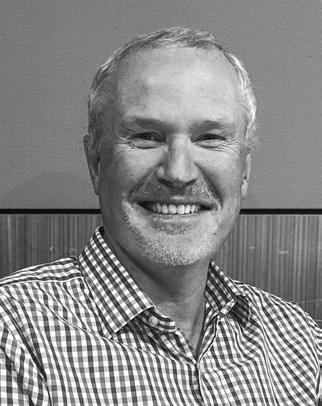
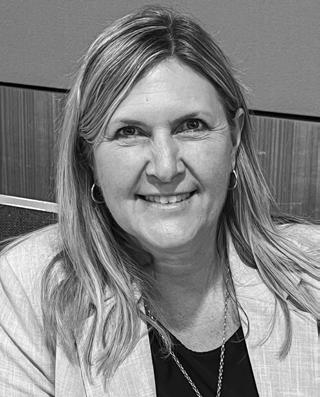
St Mark’s Lutheran Church, Mt Gravatt Qld Chaplain for Lutheran Services in Queensland, who enjoys reading, gardening and exploring new artisan interests
Most treasured Bible text: 1 John 4:10
‘This is the kind of love – not that we once loved God, but that he loved us and sent his Son as a sacrifice to clear away our sins.’
Good Shepherd Lutheran Church, Ringwood Vic
Finance manager who has served his congregation as treasurer and been a member there for 55 years
Most treasured Bible text: 1 Timothy 6:10a
‘For the love of money is a root of all kinds of evil.’
Concordia Lutheran Church Loxton SA
CEO of Riverview Lutheran Rest Home Loxton SA, who enjoys spending time with family on the river
Most treasured Bible text: John 3:16
‘For God so loved the world, that he gave his only Son, that whoever believes in him should not perish but have eternal life.’
Let the light of someone you know shine through their photo being featured in The Lutheran and LCA Facebook. With their permission, send us a good quality photo, their name and details (congregation, occupation and most treasured text) and your contact details.

While I was looking for quotes for our Coffee Break section in this edition, I was reminded of the ‘odd couple’ friendship between the late US Supreme Court justices Ruth Bader Ginsburg and Antonin Scalia.
Ginsburg was a trailblazing pioneer for anti-discrimination law in the US legal system and became just the second woman to serve on the Supreme Court. She was a small-l liberal who was small in stature but often stood tall through her opinions and oratory against what she saw as injustice. But while Ginsburg could dissent with the best of them, she also championed civility and decency and said: ‘Fight for the things that you care about but do it in a way that will lead others to join you’ and ‘You can disagree without being disagreeable’.
She was also a close friend of Scalia, who, ideologically, was on the opposite end of the political spectrum. According to USA Today, the two shared a love of opera, went souvenir shopping together when they travelled and their families spent New Year's Eve together. The duo understood that there was more to a person than their politics and they developed respect, admiration and affection for one another over the years.
Sure, it may be easier to restrict our social connections to those who think the same way we do – about religion and faith, politics, sport or whatever. We might feel that can speak more freely, without worrying about offending someone. But if we exist entirely in an echo chamber, do we learn anything? How do we gain an understanding of why people hold a different view? How do we walk a mile in another person’s shoes? And how do we practise Jesus’ command to love our enemies and those we feel are our persecutors?
I’ve personally known the blessings of friendships with people who hold different views and beliefs. Some of my closest friends are not Christians and two are members of the ‘opposing’ political party to that which I previously worked for. I thank God for them. But I know that I can do much, much better at ‘disagreeing without being disagreeable’ and I pray that I can bear the fruits of God’s Spirit, such as peace, patience, gentleness, self-control – and love.
In this edition, we are blessed to share the wisdom of members of our Lutheran family on the question of how to love and respect people we disagree with. We also share many of our popular regular features and exciting news about the new Local Mission Fund.
God bless your reading,
PS – If you’ve been wondering why your copy of The Lutheran is later than usual, we've adjusted the publication dates leading up to the Convention of General Synod in October, as we want to keep you as up-to-date as possible before, during and after this important gathering. The October–November edition will be mailed in late October to include convention coverage. This edition is being posted in late June, and the August–September edition will be sent in late August.
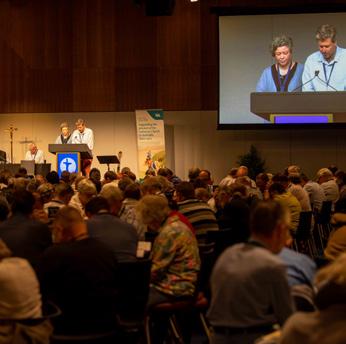




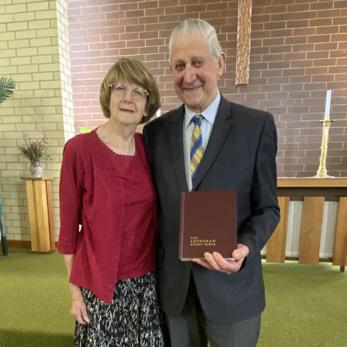
How do I love someone I disagree with?
Disagreeing well
Treating others with respect
Will they know we are Christians by our love?
Support to make mission dreams a reality
What’s on your mission wish list?
An extraordinary day at the beach
Bringing the Bible to life Way Forward update
Synod call for volunteers
Aboriginal and Torres Strait Islander readers are advised that the following pages may contain images of people who have died. Our cover: iStock.com
‘We do not live to ourselves, and we do not die to ourselves. If we live, we live to the Lord, and if we die, we die to the Lord; so then, whether we live or whether we die, we are the Lord’s. For to this end Christ died and lived again, so that he might be Lord of both the dead and the living’ (Romans 14:7–9).
Last year, I had the privilege of travelling with my wife Heidi to attend the Lutheran World Federation General Assembly in Krakow, Poland. We joined with sisters and brothers in Christ from Lutheran churches of many lands, sharing in our common purpose in the mission that our God has given us.
After the Krakow assembly, we spent a few days travelling to the areas in northwest Poland where Heidi’s Muller family ancestors had lived before they left in the 1840s with other Lutheran families to settle in South Australia with Pastor Fritzsche. The Muller’s ancestral town, which was also Pastor Fritzsche’s town, was originally known by its German name Tirschtiegel Today, in Polish, it is Trzciel. Heidi had hoped to explore the German cemetery in the town, to learn more about her family who had lived there for some 300 years before some migrated Down Under. Upon arriving in Trzciel, however, we found that this exploration was not possible as the cemetery had been totally destroyed.


REV PAUL SMITH Bishop, Lutheran Church of Australia and New Zealand
the cemetery forest in 2019 (pictured). The memorial was a crucifix of about two metres in height and had a large stone plaque at the base with inscriptions in Polish and German. The inscription was a declaration which acknowledged that we must faithfully remember all who have died in the Lord. The inscription was a call to the living, to make sure that we faithfully remember to honour God’s promises of hope in the resurrection of the dead and of the life of the world to come for all who are baptised into Christ.
WE SEE EACH OTHER WITH RENEWED EYES OF FAITH …
In 1945, when the Russian armies drove the Nazi war machine out of Poland, the remaining Polish Catholic residents in parts of the country were enraged over the suffering that had been caused to so many during the years of World War II. The German Lutherans had been driven out of towns like Tirschtiegel, the Lutheran church was razed to the ground and the cemetery demolished. Every gravestone was obliterated, with the huge cemetery area left to become an overgrown forest. It was a desolate thing to behold. That was except for a profound memorial that had been placed in
I read the inscriptions on the plaque and heard a call to Christians everywhere, including to those of us living on the far side of the earth. We are baptised into Christ, a grace-filled washing of water used together with God’s word. In our common baptism into Christ, each of us has been given life, salvation and the forgiveness of sin, made ‘righteous and heirs in the hope of eternal life’ as Luther explains in his Small Catechism. This promise of God makes us sisters and brothers in Christ, with all our struggles and uncertainties. We see each other with renewed eyes of faith, bringing mutual conversation and consolation to each other in the cause of the gospel. This faith-filled work of the baptised is what we do when we gather as delegates in the Convention of General Synod.
The plaque in the Trzciel cemetery forest, under the cross of Christ, was also a call to love one another as the Lord has loved us, with words from 1 John 4:14–16 inscribed both in Polish and German – which, in English, say: ‘God is love, and those who abide in love abide in God, and God abides in them.’
In Christ,
‘Help us receive each other, Lord, for you receive the least of us and come to us in them –because we bear your name.’
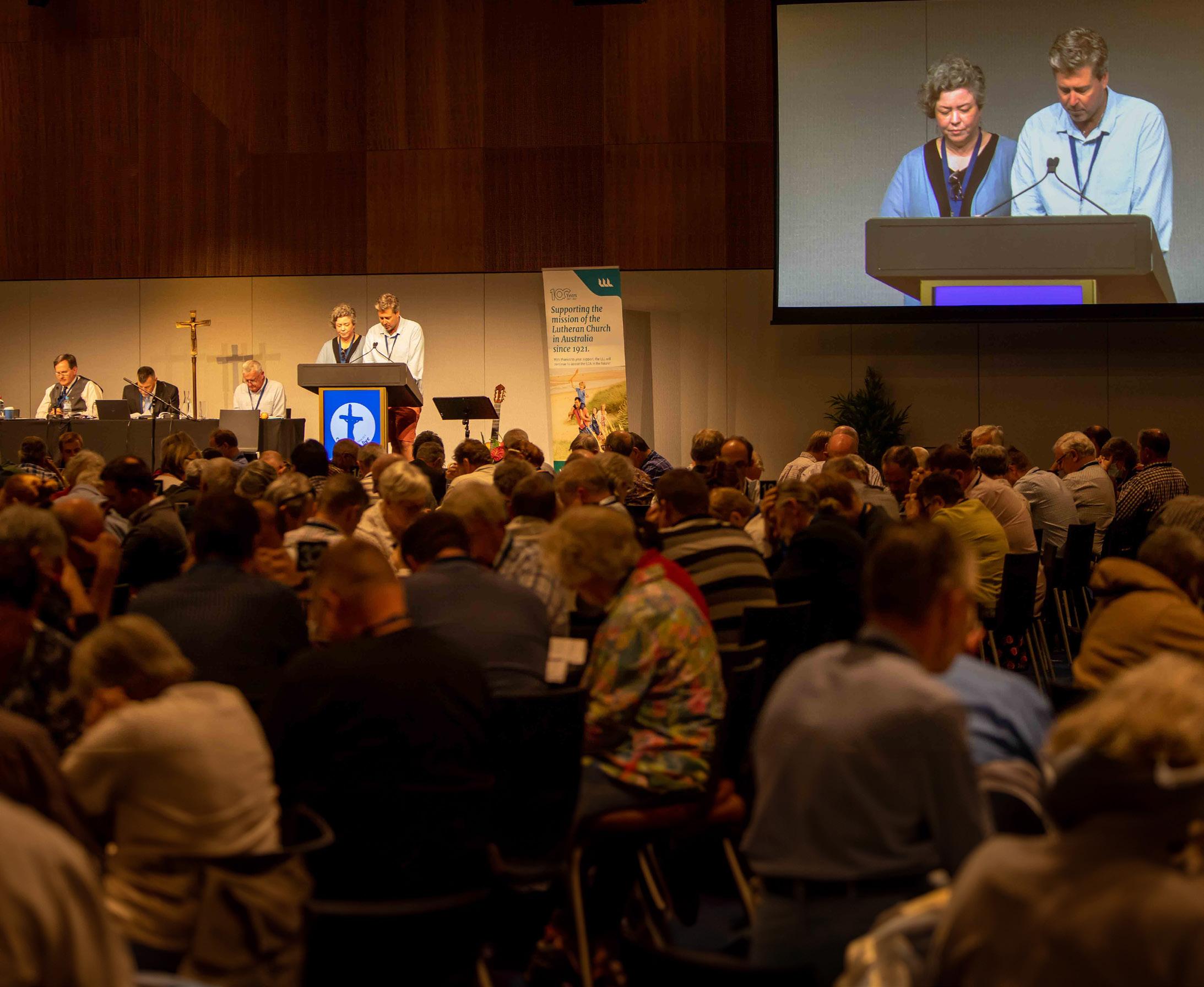
David Wear and Sue Westhorp have been friends since they met at a continuing education retreat for pastors and lay workers from the Victoria-Tasmania District in suburban Melbourne in 2006.
Chatting outside during breaks in the program, the pair discovered shared loves of music, faith and church ministry. Also in common were their down-to-earth natures and slightly irreverent senses of humour. But they differed on some big issues – most particularly their stances on the ordination of women.
It’s not a difference they have allowed to become a schism, instead serving together as chaplains at the Convention of General Synod and, until recently, on the working groups of the Way Forward project. Their decision to pray publicly together before the 2023 Synod vote on the ordination proposal put forward by Box Hill Lutheran Church, where Sue serves as a pastoral associate, was seen as a powerful expression of unity, respect and love.
‘THE QUESTION TO ASK [OURSELVES] IS, “WHAT IS THE LOVING THING IN THIS SITUATION?”, EVEN IF THIS PERSON’S RIGHT UP MY NOSE.’
‘Jesus says, “love your enemies” and love is crucial’, says David, who is pastor at Hamilton Lutheran Parish in southwestern Victoria. ’I certainly don’t see Sue – even though we have a different view – as my enemy. She’s my sister and I love her. It’s easy to like Sue and to get on with her but, as Christians, love is more than a feeling, it’s something we’re called to. And sometimes it’s hard but we love because he first loved us. He prayed for those who nailed him to the cross.’
Sue says it’s also important to be ‘very mindful’ about how we show love – or may not show love – because of how we feel. ‘So, the question to ask is, “What is the loving thing in this situation?”, even if this person’s right up my nose. “What's the most loving thing I can pray for or that I can wish in terms of their walk with Jesus and their relationship with God?”’, she asks.
She says ways of showing love to people with whom we don’t see eye-to-eye include listening to them, being open to
having conversations and not pre-judging the other person because you know their views.
‘I’ve learnt a lot from Dave’, she says. ‘I mightn't agree with everything, but I've learnt a lot and it's helped expand my thinking.’
Sue says taking the advice of the Native American proverb about ‘walking a mile in someone else’s shoes’ importantly helps to ‘humanise people beyond labels’ and is a reminder that they, too, are a child of God and made in the image of God.
‘The word which comes to mind is empathy’, Pastor David says. ‘Try and understand how something might be affecting someone else. So many times I've read someone the wrong way. When I came to know the person, my perceptions were just so far off. We're all dealing with stuff, and we all need mercy and grace.’
Both agree that having positive relationships with people we disagree with can have multiple blessings and even be a witness to others around us.
’It’s a display of the power of God's love in our lives’, Pastor David says. ‘Yeah, we might have our differences, but we love each other and the Holy Spirit – the same Spirit – is in us.
“This is how people will know you're my disciples if you love one another”. But it’s not a forced thing; it's a gift. Thankfully, it's God's love in us that enables us to love.
‘We hurt ourselves when we don't engage with people who see things differently. Like Sue alluded to, we've learnt from each other. I think it's important that we do what Christ did and love, not just because we want to be obedient to him, but because it's good for us all.’
Sue concurs that loving people we may not agree with is part of our calling to ‘be imitators of Christ’. ‘Christ showed self-sacrificial love’, she says. ‘I think that's what we're called to show, too. So, in that sense, it is a gospel witness. It's not a false witness that suggests we can all be happy together
‘WE NEED HUMILITY. IF WE'RE SO CERTAIN THAT WE HAVE EVERYTHING RIGHT, THEN WE'RE IN A BIT OF DANGER.’
and, that if you stand up there together, everything's okay. Instead, it’s about being imitators of Christ.
‘One of the blessings for me of having different opinions and listening to people with different opinions is that I know God speaks to me. I know he speaks to me through Scripture. I know God speaks to me through the sacrament, but I know he can also speak to me through other people. And it's difficult to pinpoint when that's going to happen. So why would I close off any opportunities where God might be trying to speak to me? And I think that time and time again, here’s this person saying this to me, and I realise, yeah, that’s God.’
Pastor David says when praying for people with whom we disagree, starting from an attitude of humility is crucial.
‘We need humility’, he says. ‘If we're so certain that we have everything right, then we're in a bit of danger. We can just pray that God blesses them and blesses our relationship. And ask him to help me to see what I need to see and give me a hearing heart. “God, please give me the wisdom I need and help me to be a blessing to this person. And thank you for them”.’
‘And that can be a hard prayer – to thank God for them’, Sue adds. ‘And I think sometimes our initial prayers are, “God, what are you doing? Can you please work in this person's heart?” And thankfully God knows and just waits for us to come around to what we really need to pray – “Actually, God, can you work in my heart?”’


As well as serving a Lutheran school community as its pastor, Chris Mann helps workplaces deal with conflict. Recently, he shared his thoughts with Lutheran Media’s Messages of hope about how to ‘disagree well’ with others. This is an excerpt adapted from that podcast interview.
Conflict is a values clash. When a conflict happens, it's always around something valuable to us and therefore has some emotions attached to it.
However, if we're in a conflict and we don't see the other person's perspective, even if we win, we lose. So, we might win an argument, but we lose our relationship with them, and we lose something within ourselves. We lose compassion, we lose wisdom and we lose humility.
So, instead of thinking, ‘How am I going to beat that person? How am I going to win in this situation?’, from a faith perspective it is: ‘How would Jesus have me deal with that situation?’ Sometimes that is turning the other cheek. Sometimes that is going the extra mile, but sometimes it's having appropriate boundaries.
Of course, being a Christian is an amazing help. We know that part of the Old Testament is about people being in conflict with God; people not wanting to do things the way that God wants them to do it. But, in Jesus, God chooses to enter our shoes in our conflict, and experiences as a human what it is to be in conflict with others. Jesus has conflict with religious leaders, with his biological earthly family and with his closest friends about who he is and what he's about.
IF WE'RE IN A CONFLICT AND WE DON'T SEE THE OTHER PERSON'S PERSPECTIVE, EVEN IF WE WIN, WE LOSE.
And, before talking about a difficult topic, I check my motives. Am I just trying to fix a problem, or am I trying to love a person? If I truly care about this person, I'll find a way to speak the truth, even if it's going to be difficult for both of us.
Ultimately, being able to admit that we're wrong can be the most important skill we have when it comes to conflict.
Another thing that makes a big difference is pausing and taking a breath so that we can think clearly and not take all our conflicts personally.
So, Jesus knows what it is to enter a disagreement as a human being and knows how to respond well. And sometimes we see Jesus have very firm boundaries. Sometimes we see Jesus standing up for himself. Sometimes we see Jesus very clearly having compassion. But we see especially in Jesus going to the cross, that sometimes in a conflict we actually have to just suffer and suffer well.
Sometimes suffering well results in the life that we were trying to fight for in the first place. And God's wanting to provide life for everyone on the other side of a conflict. We don't always get to experience that, unfortunately – our world is broken. But that is God's best for us: life on the other side of a conflict.
You can listen to the full interview at www.messagesofhope.org.au/disagreeing-well
Why are respect and civility important? Is respect owed or earned? What happens if we treat respect as optional or conditional? These questions and more are addressed in a Christian ethical decision-making guide on the subject prepared for the LCANZ by Nick Schwarz. The following is an excerpt from that guide, which you can find in full, along with ethical decision-making guides on 13 other topics, at www.lca.org.au/bible-studies/#ethical-decision-making
Civility is vital for healthy relationships. It means treating others respectfully even if we disagree with them about things we think are important. Civility, therefore, also entails tolerance. Respect, tolerance and civility serve as a ‘glue’ that binds people together in marriages, families, workplaces, institutions like clubs, schools, churches and political parties, or more widely in societies and nations – most especially in nations that comprise people from various cultural and religious backgrounds.
Respect for authorities and a willingness to subordinate ourselves to authorities are vital for establishing and maintaining law and order in societies. If, in a football game, players ignore the

umpire and flout the rules, the game can descend into chaos and violence. The game is only truly enjoyable when players follow the rules, and the umpire applies the rules fairly. Playing in an unruly way hurts people and spoils the game.
In the same way, communities in which people feel free to flout the law and refuse to acknowledge authorities soon cease to function well.
RESPECT, TOLERANCE AND CIVILITY SERVE AS A ‘GLUE’ THAT BINDS PEOPLE TOGETHER IN MARRIAGES, FAMILIES,
WORKPLACES, INSTITUTIONS … SOCIETIES AND NATIONS.
Some people complain about what they believe are declining standards of respect. They say that ‘common courtesy’ and good manners are not as common as they used to be, that children and young people especially no longer treat parents, elders, teachers, pastors, doctors, political leaders and police with the respect they were given in the past.
There is no one single or simple explanation to explain the levels of disrespect and incivility in contemporary society. Many things may play a part, including the dominant values of contemporary popular culture –freedom, identity, authenticity, autonomy, equality and the pursuit of personal happiness.
However, respecting other people does not mean we cannot criticise, admonish, or punish them if they have done wrong. Criticism and even punishment can be respectful if they are intended for the good of others. Parents often argue that appropriately disciplining their children is evidence that they respect them. That respect – like love – requires parents to act in the best interests of their children.

Another important point is that disagreeing with another person should not automatically be interpreted as disrespecting them. It is possible to disagree with other people’s beliefs, opinions, attitudes and behaviour while still respecting them as a person and treating them with dignity. Likewise, showing respect to a person who happens to be controversial because of their behaviour or views should not be interpreted as approval or endorsement of that person’s beliefs or actions. People are to be distinguished from what they think, say and do.
There are three approaches to dealing with disagreement that are common in our society today. One is the ‘cancel culture’ approach, in which I would demonise anybody who challenges my sacred beliefs and cherished behaviours. I would portray them as disrespectful, hateful, intolerant, discriminatory and a threat to my safety and would appeal to authorities to ban or punish them for expressing or acting upon their beliefs.
Another approach to a disagreement is avoidance. If I disagree with someone I know and want to maintain a relationship with, I treat our disagreement as a threat to our relationship. If we are to maintain any sort of relationship, the topic we disagree about must never come up in conversation. But if my disagreement is with someone I don’t know well and have no intention of getting to know better, I don’t bother saying or writing anything that will create an argument; I just let it go.
A third option is the ‘dialogue’ approach. With this attitude, my default position with people who disagree with me is to treat them as friends or potential friends, not as enemies. I welcome the opportunity to listen carefully to their perspective so I can fully understand it. I do not allow my disrespect for my friend’s argument to carry over into disrespect or disdain for them as a person. I invite my friend to fairly critique my position and be open to me fairly critiquing theirs. In this way, we learn from each other and improve each other’s ability to make our case well and come closer to the best resolution. At the end of our
GOD CREATED HUMANKIND IN HIS OWN IMAGE. THIS MEANS THAT HUMANS HAVE A SPECIAL DIGNITY AND ARE TO BE RESPECTED.
dialogue, if we still cannot fully agree, we note with satisfaction the things we hold in common and agree to disagree respectfully on the things that still divide us.
But is respect owed or earned? Consider the Golden Rule, which is found in some form in virtually every culture. The Christian version says, ‘Treat others the way you would like them to treat you’. This means that we are advised to make treating others with respect – acting as though we owe them respect – our default position. If everyone consistently observed the Golden Rule, trust, goodwill and community spirit would increase, and everyone would be happier and more prosperous. By adopting a policy of extending respect to others from the start, we are earning respect at the same time.
Indeed, the Bible and the example of Jesus’ life are full of Christian perspectives on respect and authority (see also page 12). Right from Genesis chapter 1, we read that God created humankind in his own image. This means that humans have a special dignity and are to be respected. Most of the Ten Commandments, as recorded in Exodus 20, are calls by God for his people to respect one another.
In the New Testament, Jesus taught his followers (which means us, too) to love others as he has loved us. This also means that Christians do not rush to judge others and that disagreements need not be accompanied by hostility and condemnation.
Ultimately, Christians’ respect for fellow humans is based on God’s love for them as demonstrated in the life, death and resurrection of Jesus.
Nick Schwarz is a member of St John’s Lutheran Church Unley in South Australia. He prepared the Christian ethical decision-making guides during his service as LCANZ Assistant to the Bishop – Public Theology.


The title of the well-loved 1960s Christian song ‘They'll Know We Are Christians by Our Love’, written by Catholic priest Father Peter Scholtes, is believed to reference the 197 AD writings of North African Christian Tertullian, whose letter to the Roman authorities pleaded for justice for the church, including the words, ‘See, they say, how they love one another’.
Along with lyrics that remind believers that ‘We are one in the Spirit, we are one in the Lord’, the song’s refrain (and the words of another popular Christian song ‘A New Commandment’) also echoes Jesus’ Last Supper encouragement to his disciples in John 13:35 (‘By this everyone will know that you are my disciples, if you love one another’). But is that what people looking ‘in’ from ‘outside’ our church will see?
1. Am I willing and able to engage in respectful discussion with those with a different opinion from me, instead of wanting to impose upon them my point of view?
2. In my heart, do I regard those who disagree with me as my brothers and sisters in God’s family, brought together by his grace? Do I truly love them as Christ loves me?
3. Am I willing to consider an issue from the point of view of the person with whom I disagree?
4. Do I genuinely believe that, though I disagree with another person, I will nevertheless defend their right to believe what they do as fellow believers living in the grace of God?
5. Am I able to view other people’s opinions, not as right or wrong, but simply different from mine?
6. Am I willing for my heart to be touched by any pain people may experience around a topic on which we disagree?
7. Am I genuinely able to reach out to a hurting person who has a different belief from me, and offer them care and support?
Will they be drawn in by the kindness, self-control, patience, tolerance and grace shared among people who do not always agree? When they look at our behaviour, will they recognise a place ‘where love comes to life’?
So, what are the keys to engaging in respectful discussions with people whose opinions differ from our own? And how can we ensure that our dialogue with those we disagree with is a worthy witness to Jesus’ example of loving his enemies?
To follow are points to reflect on and questions we can ask ourselves in preparation to share Christ-like conversations with those holding opposing views on any topics we are passionate about.
- Lisa McIntosh
8. Am I aware of my capacity to hurt another person and my capacity to make them feel unsafe? Do I have sufficient personal checks within me to ensure this does not happen –and to redress it if it does?
9. ‘I do not condemn a person who believes differently from me.’ Is this true for me?
10. Do I recognise that my beliefs on many issues may be formed and influenced not only by my understanding of Scripture, theology and the church but also by my personality, prejudices and life experiences?
11. Do I pray for those who believe differently from me – not that they will be converted to my viewpoint, but that they and I will be blessed as we serve alongside one another?
12. Do I want to see our church members always act with integrity and in God-pleasing ways even as they disagree?
* Adapted from the LCA’s Ordination We’re Listening dialogue handbook (2015)

War-torn Somalia, where Australians can’t go. Children forced to live in Displaced Persons Camps. Terrorist groups targeting Christians. Yet here you are …
… right where people are suffering in ways it’s hard for us so far away to understand.
So why are these children smiling?
The reason is simple. Through our Lutheran Church’s aid agency, ALWS, someone like you reached out in kindness and Christian love and supported them to go to school. Schoolbooks. Desks. Pencils and pens. Trained teachers. Support for children with disabilities. Welcome for Somali girls who might otherwise miss out.
This is a blessing you can give children now through ALWS … and keep on giving with a gift in your Will to ALWS to carry on your care!
After you have taken care of your own family, you can stretch your Christian love to others … and at the same time show your loved ones the values you hold precious. Simply contact Julie Krause from ALWS for a Lives you Touch booklet to see how to dedicate a gift in your Will to bless others. You can even make your Will online for FREE.
Call Julie direct on 0448 818 129 or phone ALWS on 1300 763 407. If you prefer, you can ask your legal adviser to add this wording to your Will:
‘I hereby bequeath to the Lutheran World Service – Overseas Aid Fund of the Australian Lutheran World Service of Somerset Drive, Albury New South Wales (insert your bequest here – the whole of my estate / the residue of my estate / % of my estate / sum of $.... / description of property) to be used by ALWS in its mission of mercy to people who are the most vulnerable, and in danger of being forgotten, in the world’s developing countries.’
In these troubled times, caring takes courage, and kindness takes love. Dedicating a gift in your Will to help children go to school through ALWS is one way you can bring love to life.
You touch the lives of those who need you now and are a blessing ALWayS!
That’s something worth smiling about ☺
30 JUNE–6 JULY
Young people who will attend Christian camps during the winter school holidays, along with camp organisers and leaders
7–13 JULY
Australian First Nations peoples during NAIDOC Week, which Recognises First Nations History and culture
14–20 JULY
All who work to support justice and advocate for victims’ rights on International Justice Day (17 July)
21–27 JULY
The LCANZ’s Local Mission Fund and coordinator Jodi Brook, that this initiative will start a wellspring of missional activity across the church
28 JULY–3 AUGUST
People who are considering studying at Australian Lutheran College, with the hope of serving the LCANZ in some capacity
4–10 AUGUST
That Lutheran Media’s Messages of hope radio spots, podcasts, videos and booklets reach people open to hearing about God’s love
11–17 AUGUST
Peace among nations at war on the anniversary of the end to WWII hostilities in the Pacific (15 Aug)
18–24 AUGUST
General Synod volunteer coordinator Pauline Renner and all who will volunteer in a variety of roles for the triennial churchwide event in October
25–31 AUGUST
Lutheran Nurse of the Year for 2024, Karen Bates and all who serve as nurses in a range of settings
BY NICK SCHWARZ
Think about how you treat other people, whether they be your siblings, children, parents, people of all ages in your circle of family, friends and acquaintances, or strangers you encounter in everyday life.
Do we, as a rule, treat everyone with respect and always act in a civil manner toward others, regardless of who they are or how they treat us? Or do we only feel that we need to show respect to those who respect to us?
What is our responsibility as Christians in this regard?
In the first chapter of the first book of the Bible, we learn that God ‘created mankind in his own image, in the image of God he created them; male and female he created them’ (Genesis 1:27).
What does ‘being created by God in his own image’ mean regarding the value, worth or dignity of humankind? Should this impact how we treat other people? Why or why not?
Still in the Old Testament, God calls on his people to respect each other in the Fourth through to the Tenth commandments.
Read Exodus 20:12–17. In each of these commandments, consider who or what we are called on to respect and in what ways.
• Fourth: Honour your father and mother.
• Fifth: You shall not murder.
• Sixth: You shall not commit adultery.
• Seventh: You shall not steal.
• Eighth: You shall not bear false witness against your neighbour.
• Ninth and Tenth: You shall not covet your neighbour’s spouse, house and other property.
Christians’ respect for fellow humans is also based on God’s love for them.
How is this demonstrated in John 3:16 and John 13:34,35?
Read Matthew 7:12. In this verse how does Jesus sum up the teachings of the Jewish law and prophets? What does this further emphasise as a default attitude of Christians towards their fellow human beings?
You probably know the so-called ‘Golden Rule’, which is summarised as ‘do unto others as you would have them do unto you’.
Some people claim that it is more respectful and loving to treat others the way they want to be treated than to treat them in the way you’d like them to treat you. They call this the ‘Platinum Rule’ or ‘Titanium Rule’. And considering the feelings and preferences of others is indeed part of showing respect. However, if what they really mean is ‘treat me the way I want to be treated, not the way you would like to be treated if you were me’, it becomes self-serving rather than focused on others. It comes from a prideful attitude that says, ‘I know what is right and good for me; if you love me, you will respect my wishes and affirm my choices’. This is emotional blackmail or the weaponising of love.
Of course, turning something good (love) into a weapon is what sin does. Christianity teaches that ever since Eve’s encounter with the serpent in the Garden of Eden (see Genesis 3), humans have sought to be like God and decide right and wrong and good and evil for themselves. Our selfish and sinful nature causes us to desire things that are not in line with God’s will and not in our best interests or those of others.
In what ways does this go against our call as Christians to be respectful?
Read each of the following New Testament verses about respect and discuss how they address the topic:
• Acts 23:5
• Romans 12:10,18; 13:1–10
• Ephesians 6:1–3
Prayer:
• Philippians 2:3
• Hebrews 13:17
• 2 Timothy 2:23
• 1 Peter 2:17; 5:5
Dear Lord, help us to remember that each person is made in your image and therefore worthy of respect. We ask your Holy Spirit to imprint on our hearts your call to love one another as you first loved us. Amen


If your congregation has a local mission idea that needs financial support to become a reality, then the LCANZ’s new Local Mission Fund may be the answer to your prayers. The fund, to be launched in early July, will be open for expressions of interest and applications for funding from congregations, districts and agencies. A total of $400,000 will be made available annually through the fund, with several seed funding grants of up to $10,000 each year and a number of major project grants of up to $100,000 each.
Local Mission Coordinator Jodi Brook says the fund aims to support church entities as they ‘seek new ways of reaching their local communities with the gospel’.
‘Through the Local Mission Fund, we are seeking to support the mission needs of a church in an ever-changing environment, as we all work to share the unchanging gospel of Jesus Christ’, she says.
LCANZ Bishop Paul Smith is hopeful that the fund – the establishment of which was authorised by the General Church Board (GCB) earlier this year –will help to ‘enhance a missional culture across the church’.
While the mission fund will be administered by the Churchwide Office, there will be a collaborative approach involving representatives of districts, congregations and agencies. It is hoped this collaboration will help identify the support and resources most needed by congregations and agencies. Ideally, projects will have broad churchwide application. However, flexibility will be offered in understanding some projects may have contextual limitations. There is no need for a one-size-fits-all approach.
Successful projects will need to align with selection criteria, including that the project enhances the missional culture of the LCANZ and supports the fostering of a missional community within the church; that it will help to equip people for mission and that it reflects foundational Lutheran theological principles. Sustainability, risk, capacity, planning, budgetary and reporting criteria also need to be addressed by successful applicants.
THE FUND AIMS TO SUPPORT CHURCH ENTITIES AS THEY ‘SEEK NEW WAYS OF REACHING THEIR LOCAL COMMUNITIES WITH THE GOSPEL’.
‘This is a new approach to local mission’, Bishop Paul says. ‘This fund is designed to help keep a strong focus on our witness and our service to our Lord in our local communities across New Zealand and Australia. This is to enhance what is called a “missional culture”, as we walk together by faith in the mission of God.
‘So, I encourage you to consider what mission activity in your local community could be the focus of an application for support. This begins with your prayer, as you ask the Lord to guide you; as you seek to serve in his name – that the light of the gospel of Jesus Christ would bring life and salvation to the ends of the earth.’
Funds will be allocated to successful applicants to resource and equip people for mission and to support projects that will have flow-on impacts for the wider church.
The LCANZ will provide application support, coaching, project monitoring, and implementation and reporting requirements support to all approved applications. Projects recommended by an annually appointed selection committee will require endorsement from the College of Bishops and GCB.
Grants from the fund are not available to provide support for ministries that are part of the normal budget process of a congregation, district or entity, or expenses such as office equipment and building maintenance.
For more information about the Local Mission Fund, including its guidelines and full selection criteria, application forms and a launch video, visit the dedicated webpage at www.lca.org.au/local-mission-fund
What's on your mission wish list? We ask people engaged in local mission. See page 14.
The LCANZ’s new Local Mission Fund is designed to support congregations, districts and agencies as they find new ways to bring the gospel to their communities. We asked three people engaged in local mission activities in the LCANZ for their thoughts and some ideas from their wish lists.

SHARON GREEN | Child, Youth and Family Ministry Director, St Petri Lutheran Church Nuriootpa, SA
What does local mission mean to you? Local mission is something that happens both in the worship and ministry spaces around our church community and out and about in our local community. It occurs in organised gatherings and our day-to-day relationships with our “neighbours”. It is relational; it’s friendship; it’s community and belonging; it’s acceptance rather than judgement; it’s invitational. It’s sharing the love and hope of Jesus in our community.’
What’s on your wish list? It would be amazing to have a family hub, a place of connection, friendship, care, community and belonging for all ages. Our mission would be to share the love and hope of Jesus through caring for the physical, social, emotional and spiritual needs of others. looking for love, care and connection.
JOEL CRAMER | Pastor, The Ark Salisbury Lutheran Church, SA
What does local mission mean to you? Local mission is being there for people, showing up and being a friend. It’s hearing people’s stories and praying for them; bringing the kingdom to them at that point in their story. They need love and grace, forgiveness and acceptance. They just want to belong and to know that they matter to someone. And we know that they matter very much to their Father in heaven.
What’s on your wish list? If I were to dream big, I think of a cafe for sharing stories. A place where people would want to
If you or someone you know is affected by domestic and family violence, visit www.anrows.org.au/get-support or call 1800 RESPECT (24-hour National Sexual Assault Family Domestic Violence Counselling Service), or Lifeline Counselling (24 hours) 131 114. In an emergency, call 000

www.preventdfv.lca.org.au
come for food and hospitality but where they stay to share stories. [With financial support you could] pay a person to drive engagement with people, create spaces for people to interact, and then do the connecting, follow-up and discipleship.
Cross-cultural ministry takes time. Volunteers need someone to drive things so that they spend their time with people. You could have an English conversation club for men. Then give them life skills and get involved in their lives.
COLLEEN FITZPATRICK | Volunteer on church and community committees, including in aged and community care; member of St Stephen’s Lutheran Church Adelaide, SA What does local mission mean to you? Mission does not cost money. It is about relationships and opening windows of opportunity for the Holy Spirit to work in people's lives.
What’s on your wish list? It's worth looking at our neighbourhoods – home and church – to see what options there are for sharing God's love with our neighbours. For example, St Stephen's is next door to some apartments. Just down the road, we have an Aboriginal health service and across the road is a mental health service for young people. We also have a street library. Maybe we should invest some time and energy in reaching out to those places.
It would be wonderful to hear some of the faith journeys of older people within our church who have faithfully served all their lives, and to use those stories to inspire younger people.

"Kevin’s approach is professional and down to earth No flashy sales pitches, just an honest appraisal No upfront fees, no push for auction and respectful of our needs and opinions We’ll be selling our family home next and without a doubt Kevin will be selling that for us too!"
For helpful real estate advice or a free no-obligation appraisal of your property call us today.


It seemed like any other Saturday morning at coastal Seacliff in suburban Adelaide. Young and old walked on the sand, with chatter and laughter drifting on the cool autumn air. Lifesavers practised their drills. Dogs raced along the beach while various watercraft traversed the glassy waters.
But some beachgoers noticed something different about this Saturday morning and asked those among a group on the shoreline what was going on. As they explained, this day of 4 May would be anything but ordinary – especially for the Bruning family, who were to be baptised in front of friends and members of their church family of Faith Lutheran Warradale.
After preliminary rites by Pastor Tim Klein, John Bruning, his wife Nicole and their children Olivia and Matthew waded into the water with Pastor Tim and Faith member Russell Gay. John, who was baptised as a teenager in the United States, had his baptism reaffirmed, while Nicole and their children Olivia and Matthew were baptised and joined God’s family, greeted by joyful cheers from supporters and sponsors watching on.
30 years’. Similarly, Nicole’s parents were not practising Christians and she wasn’t baptised as a child.
John and Nicole did not attend church after their marriage and did not raise Olivia, now 17, or Matthew, now 9, in the church until recently. Having moved with his family to Australia in 2012 for his work, John says he ‘began feeling the call of God again in late 2023’. At that time, he and Nicole began exploring churches and the couple gravitated to Faith Warradale. They then brought their children to church and soon were discussing the importance of baptism with them, along with Pastor Tim and other members.
‘THE SEA IS VAST AND EXPANSIVE LIKE THE UNIVERSE, PERHAPS LIKE GOD HIMSELF. IT IS CALMING AND BRINGS ONE BACK TO YOUR CENTRE.’
Originally from Cleveland, Ohio, but having moved to Nicole’s home city of Houston, Texas, at the age of eight, John was not brought up in the church. His parents came from different faith traditions and couldn’t agree on how to raise him, but he was inspired to attend church in his early teens by his grandmother and decided to be baptised at 16. As an adult, he stopped going to church and, he says, ‘was absent from faith for over
While the family had never heard of anyone being baptised at the beach, John says the sea has always been ‘deeply symbolic and attractive’ to the family, so they asked Pastor Tim about the possibility. ‘The sea is vast and expansive like the universe, perhaps like God himself. It is calming and brings one back to your centre’, explains John. ‘We have found the local beach very beautiful and meaningful. Our children have played on the beach since they were small children.
‘I felt this would be an appropriate rebirth with my family in Christ and Pastor Tim was very supportive. Having my baptism reaffirmed means repentance and reminds me I am reborn in the Spirit. For the rest of the family, it means they have been accepted as children of God with Christ and that they can move forward with their lives with these incredible foundations.’
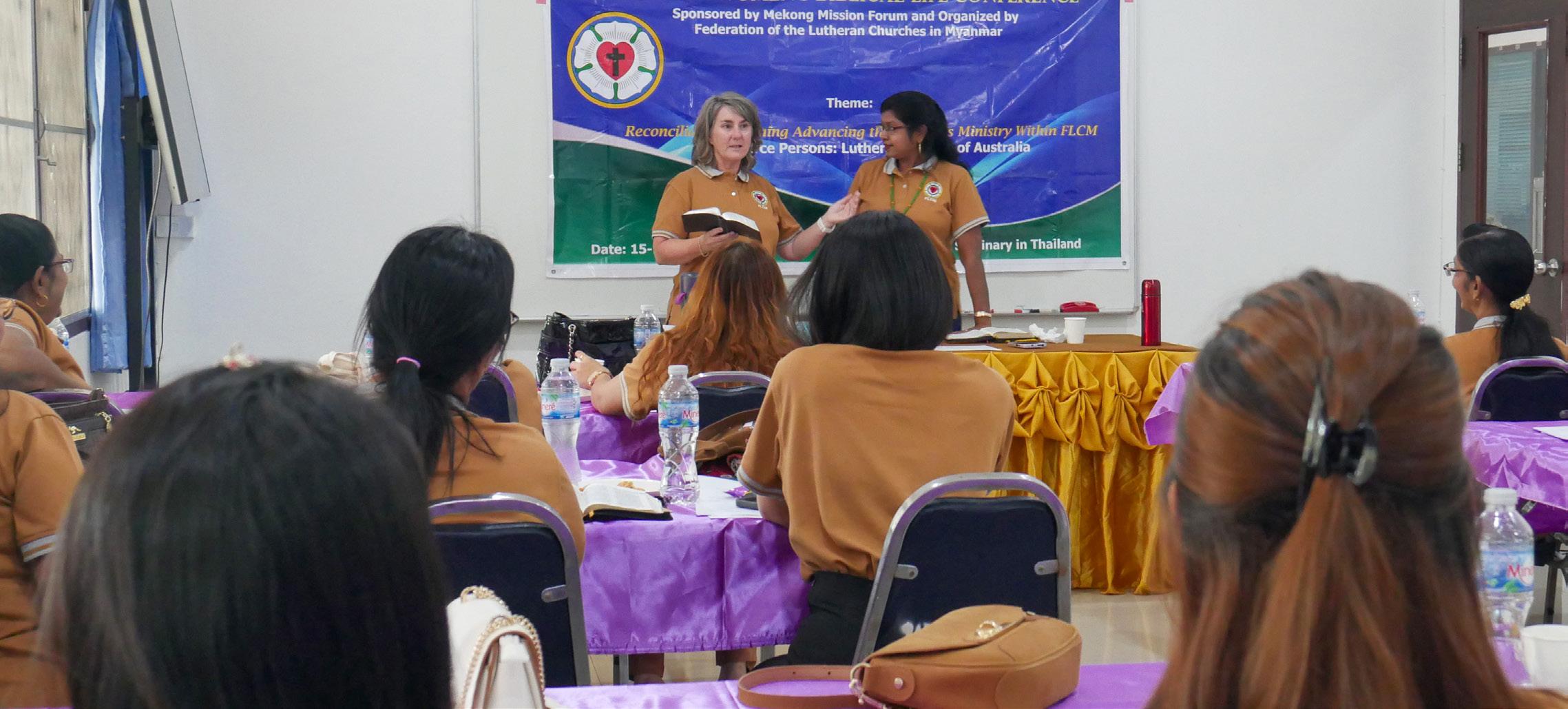
IT WAS INSPIRING AND UPLIFTING TO WITNESS THE WOMEN SHARING THEIR FAITH IN GOD.
Just two days before LCA International Mission Program Officer Erin Kerber was set to leave for the Lutheran Women’s Biblical Life Conference in Thailand in April, the event presenter due to accompany her became ill. Erin had heard Julie Kleinig, wife of LCA Interim Ministry Pastor Stuart Kleinig, speak on a podcast about helping churches work through conflict and achieve biblical reconciliation, and was moved to call her. Julie explains the impact of that last-minute phone call …
It had been a normal Saturday for me, until mid-morning when I received a call from Erin Kerber. She was travelling to Thailand on Monday to attend an LCA International Mission-sponsored conference held for the women of the Federation of Lutheran Churches in Myanmar. Her guest presenter was sick, so Erin was ringing on the off chance that I would fill in. After much wrestling with why I could go and why I should stay home and time spent in prayer, I decided to place my trust in God and go.
Postponed several years due to COVID-19, the conference was also moved from its planned location in Myanmar due to political and social unrest and was held in a Bangkok seminary.
Each day, women from the four synods led devotions, prayers and singing. We gathered around God’s word and discussed topics such as understanding the gospel, our identity in Christ, suffering in conflict and understanding the idols of our hearts. There was also much discussion around reconciling relationships and the guidance God has for us. The women appreciated being led into the word of God and how it applied to their lives.
Many of the women shared their pain from living in a wartorn country and their fears for the future, especially due to
impending compulsory military conscription for males aged 18 to 35, which will affect many of their families.
It was inspiring and uplifting to witness the women sharing their faith in God and to watch them relax for just a few days. Some expressed sadness about returning to Myanmar because with war comes insecurity with things like electricity and food supplies. Some sleep with vital items packed in case they have to flee during the night.
During our trip, we also visited Immanuel Lutheran Church and the Home of Praise, the latter of which is a day nursery in the slums of Bangkok that cares for up to 40 young children. This care allows parents to work to support their families. Following this, we walked through some of the local alleyways to see the living conditions. This is something I have only witnessed on TV, so seeing it firsthand was an eye-opener.
I feel very blessed to have attended this conference – even at short notice – and lead the women in the study of God's word. It has encouraged me in my faith and being able to meet more of my extended Christian family will stay with me for a long time.
Julie Kleinig is a member of Trinity at Chinchilla in Queensland.

We know three things about the state of ministry service in the LCANZ. Members are ageing; the number of pastors serving congregations is decreasing; and the number of vacant parishes is increasing.
So, with the support of the church’s College of Bishops, Australian Lutheran College has responded to these circumstances by developing a one-off accelerated pathway to ordained ministry that aims to prepare a cohort of candidates aged 40 to 55 for possible ordination as general ministry pastors in 2027.
Two years of intensive study and fieldwork scheduled over 48 weeks each year, will be followed by an in-service transition period. This transition may be served through a traditional vicarage placement, an internship, or an appointment to a ministry team or another directly supervised position. District bishops will work with candidates to find the most appropriate transition placement. This will enable them to begin pastoral work while finalising their vocational competence portfolio to ready them for ordination as graduate general ministry pastors.

The traditional academic year is 32 weeks long. This program uses an extended academic year to enable participants to complete a three-year Master of Divinity or Bachelor of Theology in two years. Fieldwork will be completed in the participant’s local congregation, and the congregation will provide mentoring, pastoral and prayer support. Residential intensives will be included, but most units will be taught via online webinars. The program is not Adelaide-based; participants are expected to remain in their local areas. Unit fees apply and a small stipend will be available to those accepted as candidates for ordination.
Participants will generally be aged between 40 and 55 and feel called to ordained ministry. They will be able to cope with two years of continuous study. Women are welcome to apply and, if the church moves to approve the ordination of women, participants will be people who are supportive of the female candidates studying alongside them, even if they hold to the practice of male-only ordination.

Email enquiries@alc.edu.au to find out more. An extensive initial application process which includes, but may not be limited to, evidence of academic capacity, self-reflective writing, references from family, peers and a pastor, and one or more interviews, will result in offers of provisional places. During the first six months of study, the church will work through the remainder of its standard candidate confirmation processes. This includes psychological assessment.
Grow Kids is a lectionary-based children’s ministry curriculum, designed to ‘Grow Kids’ in knowing Jesus and responding to his love through storytelling, worship and service. And now the full teaching curriculum covering the three lectionary years is available for free download. Grow Kids has many components to choose from and provides opportunities to tailor sessions to suit your audience. You can choose from the varied sections like a menu.

If you need a school classroom devotion, you can use the Story of the Week, the prayer and blessing for your students. There are excellent background notes about the Bible story to help explain the context of the story. The delivery of stories ranges from a simple re-telling to a creative drama. Bible stories are included from the Old and New Testaments. If you would like to focus on the catechism, children can be introduced to the basic teachings of the Christian faith. The Lutheran Church uses Luther’s Small Catechism, based on the Ten Commandments, the Apostles’ Creed, the Lord’s Prayer and the sacraments of baptism and holy communion. Download Grow Kids at www.growministries.org.au/shop
Yoga and respect (see pp 8-9) are among the newest additions to the LCANZ's ethical decision-making guides. The guides are intended to help church members consider how they might respond to contemporary ethical issues but are not ‘official’ statements of the church. Download them at: www.lca.org.au/bible-studies/#ethical-decision-making
Many complaints can be resolved before lasting hurt is caused, by addressing them quickly in a non-threatening manner and by raising the issue directly with the relevant person or organisation in a thoughtful and courteous manner. If this is not applicable or possible in your situation, you may lodge a complaint with the Professional Standards Department in any of the following ways: Phone the free-call number (Aust 1800 644 628 NZ 0800 356 887), email complaints@lca.org.au or write to Confidential, PO Box 519, Marden SA 5070.

Lutheran primary school student leaders in New South Wales and the Northern Territory have had the opportunity to attend Australian Lutheran College (ALC) sessions on Christian leadership for the first time in 2024.
ALC’s Director of Applied Learning, Emma Graetz has been leading sessions in the two regions and has again been working with students in South Australia and Victoria, where the training has previously been offered. In the New South Wales Riverina, almost 150 students have participated to date while students in Darwin have also taken part.
Good Shepherd Lutheran College Northern Territory
Principal Matthew Qualischefski says when the opportunity arose for Year 5 students to be trained, the school wanted to engage with ALC ‘due to their experience in this space and also because the Lutheran values of this program align with our college’.
Emma says ALC ‘greatly appreciates the partnerships formed with the host schools and Lutheran Education Australia regional offices’. ‘It is exciting to see more schools wanting to offer this Christ-centred training’, she says.
To find out more about ALC’s training options visit the website at https://alc.edu.au/ or email training@alc.edu.au
1:1,
For more prayer and devotional resources, including a listing of daily Bible readings for each day of the church year, go to www.lca.org.au/ wpp/prayers-devotions • Lutheran Tract Mission also provides the readings in a booklet, which can be accessed electronically at www.ltm.org.au/tract/view/70593-daily-bible-readingsfor-2024 or as a printed booklet through the LTM office (phone 08 8360 7222) for a donation of 20c per copy.
BY TANIA NELSON
Lutheran Media is excited to introduce you to our Training for Missional Impact webpage, which you can find online at www.lutheranmedia.org.au/training-for-missional-impact
Designed to assist you in utilising media as you serve God in your local area, you can listen to a podcast on providing a gracious welcome to your church, view a webinar on ‘Challenging our digital boundaries: social media and web presence as missional opportunities’, or request a speaker from Lutheran Media to present to your congregation, ministry group or meeting.


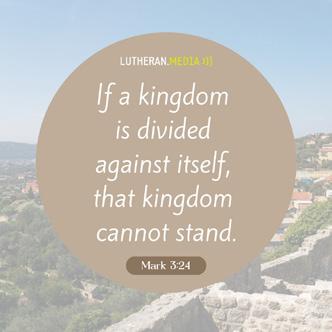

You can also see and share gospel images from www.lutheranmedia.org.au/social-media
These social media posts are based on weekly gospel readings and appear on the webpage each Monday so that you have time to grab the latest image for your church, school or ministry area before Sunday worship. The image can be used in bulletins, newsletters, PowerPoints, and on social media. Click on the image and you’ll see sharing options. Or right-click on the image to copy or save it elsewhere.
Feel free to contact Lutheran Media at luthmedia@lca.org.au or freecall 1800 353 350 for any assistance with sharing Jesus via media. Visit our websites to find resources you can share in your neighbourhood, too: www.lutheranmedia.org.au and www.messagesofhope.org.au
BY ANNE HANSEN
I want to love and live like Jesus. Why? Because I know it’s the best way to live. Through Jesus’ life and how he lived, he gave us examples of how to conduct ourselves with family and others.
When we love and live like Jesus, we shed self-interest – with our spouse, our kids, friends, everyone. His brand of love sees over walls of resentment and barriers of betrayal. When we open our hearts, love changes our minds. Our minds can be transformed when they receive a divine impulse from the Holy Spirit to our hearts. It’s what Paul was getting at when he said, ‘You’ll be changed from the inside out’ (Romans 12:1b MSG).
Lutheran Tract Mission has many resources to help you grow to be like Jesus in your words and actions. Go to the LTM website: www.ltm.org.au and check out the Christian Growth category.
Anne Hansen is Lutheran Tract Mission Development Officer.


Many people have told LCA Communications that we were sending you too many emails and wanted us to include news from every LCANZ department in one eNews. We are taking steps to fix that. Over the past 12 months, we have been merging all our Churchwide eNews lists into just one, LCA eNews.
So, look forward to LCA eNews becoming your one-stop-shop for news and resources from every mission, ministry and service area of the Churchwide Office. We hope you enjoy the new slimmed-down way of communicating with you.
As always, though, we welcome your suggestions for improvement. Email us your ideas at lca.comms@lca.org.au
To receive LCA eNews each fortnight, go to www.lca.org.au/enews

If your LCANZ congregation, school, aged care or community service has a project supporting the welfare of children that needs financial backing, the church’s Borgfeldt Legacy grants may be able to help.
Two funding streams are available: major grants with a maximum value of $50,000 and minor grants, which are worth up to $10,000.
An application may be for a specific once-off project or initial support for a longer-term child-focused program. Departments and agencies of the church also are eligible to apply for the grants. Applications for major grants close on 30 September each year, while minor grant applications are open year-round. More details about the application process, promotional materials, an information booklet, application forms and acquittal reports are available at www.lca.org.au/borgfeldt-legacy
BY TIM ROSS

The Safe Church training program has now been modified and improved. We listened carefully to your feedback and worked hard to incorporate your suggestions.
Level 1 training has been updated and reduced to two relatively brief sessions: ‘Level 1 – Induction’ and ‘Level 1 – Safeguarding’. There is no longer any further need for ‘Level 1 Refresher’ training and recognition of prior learning is available for comparable courses in relation to both Level 1 sessions.
A self-paced online version of the training is available on iLearn. The Australian Lutheran College team has amended iLearn to reflect the changes, with the updated modules available.
We are also pleased to offer a ‘live online’ format. Participants can attend an online training session at the scheduled time that best suits them, interact with their online trainer and have questions answered.
It is anticipated that training will be conducted exclusively online by the end of the year, with face-to-face training being phased out.
For further details and to register, see the Safe Church training webpage at www.lca.org.au/safechurchtraining
Contact the Professional Standards team for further information via https://www.lca.org.au/professional-standards
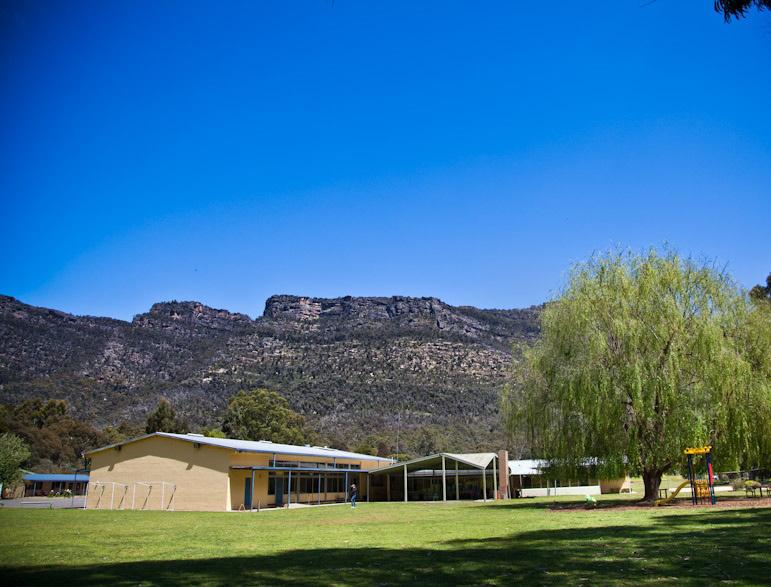


Tandara Lutheran Camp has highly satisfied guests and is growing as a result. We need a permanent, hands-on Assistant Manager to share the workload, as we continue to improve our guest experience. As a small Christian business, there is room to make a positive difference. There’s always something to do or improve, so you will grow your already broad work experience even further, while working in God’s service, in the most beautiful of settings with lots of wildlife.
The role comes with a house at greatly reduced rent, and a competitive salary dependent upon experience, plus superannuation.
Feedback from church members has been critical in helping to refine the LCANZ’s Way Forward framework to go to General Pastors Conference (GPC) and General Synod for deliberation and vote later this year.
Consistent with Synod’s request last year to find a way for the LCANZ to operate as one church with two practices of ordination, the framework was released for feedback on 26 April and addressed two primary components:
removal of the clause in the church’s Theses of Agreement (VI:11), which prohibits the ordination of women; and
provision of a theological-pastoral place (‘the Conference’) in the church for congregations and individuals who uphold the practice of male-only ordination.
It is anticipated that a revised framework, which reflects the feedback received from across the church, as well as the input of the Way Forward project’s Theological, Constitutional and Governance working groups, will be considered by the General Church Board and the College of Bishops at their joint July meeting. Once approved, this will be published in the Book of Reports for the Convention of Synod.
A Way Forward webinar for Synod delegates will be held on 14 August and face-to-face gatherings to consider the framework and its possible implications for the church are being organised by the Districts.
‘Throughout the project, the Way Forward team has sought feedback from the church, which has been taken into account in developing a final framework‘, LCANZ Bishop Paul Smith said. ‘The team is grateful to everyone who submitted questions and comments, as they have guided the revision
of the framework in a way that would allow as many people as possible to support it. We trust the Lord of the church is faithfully leading his people in this work.’
The framework, including the Conference concept, was developed in response to feedback from the church on three framework options released in September last year. An overwhelming theme of the feedback was that people wanted to continue as one church. At the same time, responses called for a way for the church to pastorally care for those who uphold male-only ordination. The Conference concept aimed to provide this place with minimal change to the organisation of the church. Feedback from across the church, however, has raised concerns that the Conference might not achieve the outcome for which it was created. The project team listened to these concerns and on that basis may consider amending the current iteration of the framework with an alternative mechanism to the Conference concept.
Bishop Smith said that, ultimately, the final framework to go to GPC and General Synod would be the result of combined work of the people of the church and the Way Forward project team. ‘Most importantly, this collaboration will develop a framework that gives us the best possible chance of moving forward in unity, as one church, under Christ’, he said.
Visit the Way Forward webpage: www.lca.org.au/wayforward


In one way or another, everyone in the LCANZ will be affected by the outcome of the General Synod 2024 vote on the proposal for the Way Forward in the ongoing debate on ordination. Therefore, everyone has been invited and encouraged to participate in this important conversation. As members of the church have engaged in consultation and provided feedback, they have been asked to abide by the same principles we ask of General Synod delegates. These principles include respect for everyone, regardless of the position they hold on ordination, gentleness in language and humility in attitude. The principles are based on the LCANZ Standards of Ethical Behaviour, which, in turn, are based on Colossians 3:12–14: ‘Therefore, as God’s chosen people, holy and dearly loved, clothe yourselves with compassion, kindness, humility, gentleness and patience. Bear with each other and forgive one another if any of you has a grievance against someone. Forgive as the Lord forgave you. And over all these virtues put on love, which binds them all together in perfect unity.’
Everyone participating in this conversation is asked to adopt these principles for the sake of Jesus Christ our Lord and the building up of his church. This includes how we frame communications to the project team and others in the church, engage on social media, and speak about others in our church, family and social networks.
The Five Principles of Dialogue were developed in 2013 by a five-pastor team called the Ordination Dialogue Group to assist them in working through the issues of the ordination conversation in a spirit of mutual respect and positive dialogue. The team offered these principles to the wider church, and they formed part of the delegates’ preparation for the 2015 General Convention of Synod. The five principles are as relevant today as they were 10 years ago.
1. Communion: Because God has gathered us in communion with one another through his word and sacraments, we have freedom to dialogue with one another on contested matters. Strengthening this God-given communion is the goal of dialogue.
2. Trust: Because God has made us brothers and sisters in Christ, we can trust God to use our communion to build us up in love and use our differences to grow us in holiness of life.
3. Listening: Because God gives each of his children a unique perspective, we can listen to each other trusting God that as we listen, we will grow in understanding of ourselves, of the other person, and of the communion that God creates.
4. Speaking: Because God gives each of his children a unique perspective, we can speak to each other trusting God that as we speak, we will grow in understanding of ourselves, of the other person, and of the communion that God creates.
5. Patience: Because the communion God gives us in Christ is God’s doing and not ours, we can be patient in listening and speaking to each other, trusting that God will deepen the unity he has already given us.
For more on the LCANZ’s Principles of Engagement and Guidelines for Respectful Debate, visit the webpage at www.lca.org.au/wayforward/principles-engagement
If you have a heart for serving the church, can be in Adelaide in late September and/or early October this year and don’t already have a role at the LCANZ’s Convention of General Synod, then we need you!
General Synod volunteer coordinator Pauline Renner, who is serving in that role voluntarily two days per week until the close of the Convention at Concordia College Highgate on 7 October, is keen to hear from people who have the time to help with any of a wide range of tasks before, during and after the triennial event (4–7 October) and General Pastors Conference (GPC) which precedes it from 29 September to 2 October.
‘We need a large team to coordinate all aspects of this important event in the life of the church’, Pauline says. ‘But while volunteers give of their time and talents in serving others, it’s not just a one-way benefit. It promises to be a wonderful opportunity to meet and serve alongside a wide range of people from across the church. And, I know from my own experience, that I usually get more out of volunteering than I give.’
Pauline, who also volunteers with Glynde Lutheran Church’s English language program for new arrivals and other people for whom English is a second language and with Adelaide University’s ‘Talking with Aussies’ program for international students, is a member at Tea Tree Gully Lutheran Church in Adelaide’s northeast. For more than 20 years she worked as the event coordinator for the National Motor Museum in the Adelaide Hills and said two things in particular appealed to her about serving as the Synod volunteer coordinator –‘I do love organising and I love an end date’, she admits.
Available volunteer roles for General Synod include:
• Set up for GPC and Synod on Saturday 28 September and pack down Monday 7 October.
• Parking marshals – direct and assist delegates, visitors, staff and volunteers (GPC and Synod)
• First Aid – volunteers must have a current First Aid certificate (Synod only)
• Catering/meals – assist at morning tea, lunches and/or the Synod dinner on 4 October (Synod only)
• Bag drop/pick up – check in and out bags, umbrellas etc of delegates and visitors at the beginning and end of the first and last days (Synod only)


All volunteers will need current Working with Children and Vulnerable People checks.

Sunday 25 August 9.30am Worship followed by a celebration lunch
All past and present members and pastors welcome Inquiries: 0491 193 398 mark henderson@victorlutheran org
To register your interest in volunteering, contact Pauline at synod@lca.org.au
A Congregational Life website designed to support congregations and agencies in areas including worship, pastoral care, discipleship and faith teaching, outreach and church planting, and community service is being developed by the church.
As an outcome of a recently released report addressing the LCANZ’s ongoing ministry challenges, including its pastoral supply shortage, the website will help equip faith communities as they adjust to the church’s changing context. To be launched later this year, it will offer relevant resources and raise awareness of learning pathways that are currently available or being developed. The website was recommended in the summary report of the Ministry Future project, which was received with approval in May by the General Church Board (GCB).
Led by Victorian District Bishop Emeritus Greg Pietsch, the project was established by the College of Bishops (CoB) in 2022, with the support of GCB, to ‘consider and develop a coordinated response’ to the decreasing number of pastors in the LCANZ and the changing nature of its communities.
The report contains a multi-faceted approach to tackling what Pastor Greg says are ‘clearly evident’ difficulties facing the church. The three-part response developed to address these challenges is:
1. a regional rather than solely congregation or parish approach to organising pastoral ministry,
2. suitable pathways into general and specialised service – both lay and ordained, paid and voluntary, and
3. a regular way of ordering the service of lay people involved in word and/or sacrament ministry, in addition to the existing preparation and call of Specific Ministry Pastors (SMPs).

‘(We have) a large number of pastoral vacancies, long periods in vacancy with frustration over the call process and communities struggling to afford a pastor’, Pastor Greg says in the report.
‘Yet ministry needs and mission opportunities still continue in the Lord’s harvest field.’
He says each LCANZ District has been responding as best it can, using the resources available, such as drawing on retired pastors and, in some cases, licensing lay people to undertake what would otherwise be tasks of an ordained minister.
‘Regionalisation envisages a zone or region of congregations and parishes being served with the full range of word and sacrament ministry collectively, using a team approach led by an overseeing General Ministry Pastor (GMP) with the possibility of other GMPs or SMPs in the team as well’, Pastor Greg says.
The project prepared a ‘Guide to Regional Ministry’ and a model agreement to help local communities make the change. These are available from District Bishops.
Pastor Greg also is thankful to God that laypeople are taking up ministry service in many ways – service which, he says, ‘needs affirmation, training and support’.
To give a better understanding of the church’s situation, and as an impetus to meeting new training needs, the Ministry Future project has drafted a proposed LCANZ Ministry Personnel Framework. This maps out the range of ministry roles and specialisations across the church, with corresponding education and formation, accreditation and call or appointment mechanisms.
The Ministry Future project also contributed to the ongoing examination by CoB and the Commission on Theology and Inter-Church Relations of the ‘ordering’ of ministry.
‘Ordering’ ministry is the term used to describe the way the church understands and delineates the different roles in church ministry, including the distinction between lay and ordained vocations or callings.
Pastor Greg says the Ministry Future project ‘does not pretend to be every answer to the changes we face’, but rather that it hopes to be of help. He also asks LCANZ members to commit the church, its communities and the project outcomes to prayer.
Read more, download the Ministry Future report and access a questionand-answer document about the project at www.lca.org.au/ministryfuture
by Alison Schutz
Few people can say they have served in a role for 70 years, but Hedley Scholz can! Hedley, 89, was recognised recently for seven decades of volunteering as a lay reader for his Lutheran community at Eudunda in country South Australia. In 1954, Hedley was approached by members of the then Julia Ascension Lutheran Church to become a lay reader as the incumbent, August Obst, wanted to step down. At the time, the church constitution stated that a lay reader had to be male and be at least 21 years old. As Hedley was technically too young, the congregation decided to bend the rules!
Hedley read at Julia for 11 years. After his 1963 marriage to Joy Materne – who
continues to be a strong support for Hedley – the couple transferred their membership to St Paul’s Lutheran Church Eudunda, part of the United Evangelical Lutheran Church in Australia. After Church Union in 1966, Hedley was elected to lay read in Emmaus Lutheran Church, which was demolished in 1979 and replaced with a new church building – the current St John’s Lutheran Church.

Hedley, who also features in Going GREYT! in this edition (see pp 28-29), is
thankful to God for giving him a strong and clear voice and confesses that having milked cows for 69 years, he has had plenty of practice at shouting at the cows and dogs, which may have helped to strengthen his voice!
To mark his 70 years of service, St John’s chairperson Ben Schutz recently thanked Hedley and presented him with a copy of the Lutheran Study Bible. Hedley said he enjoys lay reading and witnessing for the Lord and will continue as long as he can. He is set to celebrate another milestone in August – his 90th birthday.
Alison Schutz is a member of St John’s Eudunda in South Australia.
Enrolled Nurse Karen Bates of Angaston in South Australia’s Barossa Valley has been named the 2024 Lutheran Nurse of the Year.
Karen’s award was announced by the Lutheran Nurses Association of Australia (LNAA) on 12 May, also International Nurses Day. Sue Morrison, a retired nurse from Warrnambool in Victoria, was awarded a Certificate of Meritorious Service by LNAA.
Karen works at Angaston Hospital, caring for patients in theatre, medical and surgical wards, as well as in palliative care and paediatrics. Those who nominated her referred to her versatility, her compassion dealing with patients and their families, and her eagerness to continue learning.
Karen is also one of five Pastoral Assistants at the Angaston Lutheran church, as well as
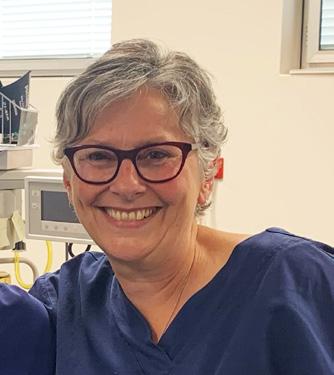

serving as a regular organist at funerals and Sunday services.
Sue Morrison began her nursing career at Warrnambool Base Hospital in 1968, completing her training there in 1971. By 1985, Sue was appointed to the role of unit manager of the children’s ward and by 1989, she was working in senior
accommodation.
by Bob Wiebusch
nurse management roles. In 1997, she was appointed Director of Nursing at Warrnambool South-West Healthcare. Sue has a Master of Health Administration degree and a Master of Business Administration degree.
She has served as secretary of Warrnambool Lutheran Parish, and as treasurer of the Hawkesdale congregation. In 2016 she was appointed to the Victorian District Church Council. She has also served as a board member of Eventide Lutheran Home in Hamilton and Sunnyside Lutheran Retirement Village in Horsham, both in Victoria.
Pastor Bob Wiebusch edits the LNAA’s In Touch publication and is a former editor of The Lutheran


by Aaron Glover
More than 870 people sent a bright message of hope from Queensland to children and families displaced by war in Ukraine recently through ALWS Walk My Way Ukraine.
The 873 walkers and runners stepped out in the Brisbane event in May, which – thanks to the help of participants, volunteers, sponsors and other supporters – had raised more than $181,000 to support the people of Ukraine by 24 May.
Participants dressed in bright blue t-shirts embroidered with sunflower logos made for a stunning sight as they crossed the Goodwill Bridge at Southbank and walked or ran along the picturesque Brisbane River.
Up front runners led by LCA Queensland District Bishop Mark Vainikka were followed by young and old, Lutheran family and community friends, walking side-by-side to send a special message of love and support from the heart of Brisbane to the hearts of the Ukrainian people.
Bishop Mark, who has met Ukrainian refugees in Europe, shared his motivation for taking part. ‘I’ve seen the impact of displacement especially in the lives of the young’, he said. ‘By participating in Walk My Way Ukraine, I hope to have a small, positive impact on their lives.’
The walk was a beautiful expression of faith in action, with members from Lutheran congregations, schools and care services coming together to share their Christian love through ALWS. Queenslanders travelled from places such as Gladstone, Kingaroy, Dalby, Hervey Bay and the Gold Coast to be part of this collective expression of faith.


Organised in partnership with the Ukrainian Community of Queensland and with the support of platinum event partner LLL Australia, the event raised much-needed funding for projects delivered by ALWS’s international partner Lutheran World Federation. The money raised will go towards providing emergency food and water for families in need and psychological support for displaced children, rebuilding classrooms and building bomb shelters under schools so children can return to learning and renovating 1500 apartments in Kharkiv so families can return home.
ALWS Walk My Way Ukraine featured 3-kilometre and 12.5-kilometre courses that began and finished at a community hub at Queensland University of Technology Gardens Point Campus. The hub featured
Ukrainian food stalls, live entertainment and a special kids’ zone.
As walkers made their way through Brisbane, their bright shirts displayed the unofficial national flower of Ukraine, the sunflower. The sunflower is a symbol of peace as it always turns toward the sun, so its shadow falls behind it. This is the hope that walkers shared as they stepped out at Walk My Way Ukraine.
Thank you to all those who have supported Walk My Way Ukraine 2024 – and it’s not too late to donate! Go to https:// walkmywayukraine.org.au/ and click on the Donate button – or click on ‘Support a friend’ if you wish to support an individual or a team who took part.
Aaron Glover is ALWS Community Engagement Manager.
Extended
• Rev Robert J D’Antoni
Tingalpa-Mt Cotton Qld to Cleve SA
• Rev Timothy C Castle-Schmidt
Onkaparinga SA to Nunawading-Waverley Vic
• Rev Nathan E Hedt
LCA Churchwide Office (New and Renewing Churches) to Para Vista SA
• Rev Nathan J C Glover
Toowoomba Qld to Faith Lutheran College Plainland Qld
• Rev Simon J Mackenzie
Goombungee-Maclagan Qld to Port Lincoln SA
• Rev Basil M Schild
Yirara College Alice Springs NT to Indooroopilly Qld
• Rev Stephen P Schultz
SA-NT District to Aberfoyle Park SA
• Rev Mathew L von Stanke
Newcastle NSW to Golden Grove SA
• Rev John W Strelan
St Stephens Adelaide SA to St Johns Unley SA
• Rev Tommi J Vuorinen
St Andrews Brisbane City Qld to Indooroopilly Qld
Accepted
• Rev Timothy C Castle-Schmidt
Onkaparinga SA to Nunawading-Waverley Vic
• Rev Albert P Gast
SA-NT District (School Chaplaincy Ministry at Cornerstone College Mount Barker SA) to SA-NT District (Interim Ministry assignment to Birdwood SA)
• Rev Nathan J C Glover
Toowoomba Qld to Faith Lutheran College Plainland Qld
• Rev John W Strelan
St Stephens Adelaide SA to St Johns Unley SA
Declined
• Rev Matthew B Edgecomb
Strathalbyn SA to Port Lincoln SA
• Rev Basil M Schild
Yirara College Alice Springs NT to Indooroopilly Qld
• Rev Stephen P Schultz
SA-NT District to Aberfoyle Park SA

• Rev Tommi J Vuorinen
St Andrews Brisbane City Qld to Indooroopilly Qld
• Rev Christopher R Podlich – Installed to Beyond Lutheran Church Qld (held at Griffin State School) on Sunday 14th April 2024 by Bishop Mark Vainikka.
• Rev Howard J Beard – Installed to Balaklava and Carlsruhe-Saddleworth Parishes on 26 May 2024 by SA-NT District First Assistant Bishop Adrian Kitson
• Rev Stephen Radke – Installed as Finke River Mission Support Worker at Alice Springs NT on 26 May 2024 by Pastor Rob Borgas.
• Rev Christopher R Podlich – Ordained as a Specific Ministry Pastor to Beyond Lutheran Church Qld (held at Griffin State School) on Sunday 14th April 2024 by Bishop Paul Smith.
• Rev Andrew Neumann – Leave of absence extension approved to 1 May 2025
• Rev Ryan J Norris – Leave of absence extension approved to 30 April 2025
• Rev Stephen G Nuske – Change of call eligibility status from General Ministry Pastor to Pastor Emeritus from 21 April 2024
• Rev Stephen W J Radke – Readmitted to the LCANZ Roll of Pastors as General Ministry Pastor as of 18 April 2024 and assigned to Finke River Mission
• Rev Miloslav Velebir – Change of call eligibility status from Specific Ministry Pastor to Pastor Emeritus from 18 April 2024
• Rev Marcus Wheeler – Change of call eligibility status from Aboriginal Pastor to Emeritus Aboriginal Pastor from 24 March 2024
• Mrs Gloria Maxine Kirchner nee Fiegert, widow of Pastor Joe Kirchner, died on 6 March 2024. Her funeral was held on 4 April 2024 at Taylor and Forgie Funerals Gawler SA
• Mrs Cynthia Grosser nee Martlew, wife of Pastor Denis Grosser, died on 18 April 2024. Her funeral was held on 8 May 2024 at Holy Trinity Lutheran Church Horsham Vic
Self-contained 1 or 2-bedroom city cottages and 3 or 4-bedroom beach houses – 4 Harriett's Cottages can now be found via www.noblebnb.com.au Make contact via the website and form or phone Noah on 0404 608 196
On 26 Jan 2024, the International Court of Justice made an interim judgment of plausible genocide against Israel because of the scale of its bombing and starving of the civilian population in Gaza. Israel has ignored the Court’s order to stop the genocide. Many international legal, academic, religious and human rights organisations have ruled that the physical separation and legal discrimination that Israel has imposed on its Palestinian population constitute the international crime of apartheid. Israel's treatment of the Palestinian population transgresses international law and is in violation of more than 100 UN resolutions.

On 20 Oct 2023, the combined Palestinian Christian churches (including Lutheran) issued this open letter to Western church leaders pleading with them to stop ignoring or supporting the ethnic cleansing of Palestinians that has been occurring for 75 years and that is the ultimate cause of this conflict: https://www.change.org/p/anopen-letter-from-palestinian-christians-towestern-church-leaders-and-theologians Are Australian Lutherans aware of this letter, and what is our response to our Christian brothers and sisters in Palestine? Do we respond and act like the Good Samaritan, or do we pretend not to notice like the priest and the Levite? Do we even defend Israel’s industrial-scale state terrorism with some perverted end-times theology as somehow being God’s will?
Dietrich Bonhoeffer developed his deep insights into discipleship against the background of a comfortable Lutheranism that ignored the injustices being perpetrated on Jewish people in 1930s Germany. In the spirit of Bonhoeffer, we call on Christians to read the Open Letter from Palestinian Christians, to all take our discipleship seriously and to pray and work for God’s righteousness and justice to be brought to the Palestinian situation, so that Jew, Muslim and Christian can once again live together in peace and equality.
Peter Schulz, Pastor Michael Pietsch, Gerhard Ruediger, Jessica Dart-Paul, Fergus McGinley, Dr Maurice Schild
Opinions expressed in letters are those of the writers and do not necessarily reflect those of the editor or the Lutheran Church of Australia and New Zealand. Shorter letters will be given preference over longer letters. Subscribers’ letters will be given preference over those from non-subscribers. Letters longer than 300 words and those containing personal attack will not be published. No more than two letters from the same author will be published in a calendar year. Some letters may be edited for clarity.
1 PETER 4:10
In Going GREYT! we feature stories of some of our ‘more experienced’ people within the LCANZ, who have been called to make a positive contribution in their retirement. We pray their examples of service will be an inspiration and encouragement to us all as we look to be Christ’s hands and feet wherever we are.
BY HELEN BRINKMAN
Hedley Scholz credits dairy farming for giving him his strong voice. To be more precise he says it’s a credit to the cows and the working dogs which herded them.
‘I think God has blessed me with a strong voice, as I was a dairy farmer for 69 years and I had been shouting to the cows and dogs so much’, says Hedley.
It’s this upbringing that has established a voice perfect for lay reading, a service that Hedley has provided to his local Lutheran congregations for the past 70 years. That achievement was recognised in April by his fellow members at St John’s Lutheran Church, Eudunda, in South Australia’s Mid North.
Despite being set to turn 90 in August, Hedley’s strong voice still allows him to continue to serve as a lay reader. It’s a role that he began at age 20 at the Ascension Lutheran Church, Julia, SA. Over time, he has also helped out at other local Lutheran churches in the parish.
Hedley recalls travelling the nine miles (14.5 kilometres) from his home to Julia church on a cold Sunday morning one August with thick fog developing. Despite there being only three members in attendance for worship that day, Hedley didn’t shorten the service!
‘GOD’S WORD HAS BEEN MY GUIDE IN LIFE. IT OFFERS DIRECTION, CORRECTION AND FORGIVENESS ... GOD’S WORD SHOWS US … THE WAY TO ETERNAL LIFE.’
Born in 1934, the youngest of four siblings, Hedley was part of the fifth generation of the Scholz family in the region. His great-great-grandfather, Johann Gottfried Scholz, was born in Silesia in 1805 in present-day Germany and migrated to South Australia in 1845.
Johann settled at Light Pass in the Barossa Valley and was known to walk the more than 40 miles (almost 70 kilometres) led by the light of the moon on a Saturday night to Klemzig in Adelaide. There he would attend church services led by Pastor August Kavel – which were known to last for hours – before returning home again on foot.
Hedley has documented the lives of seven generations of the Scholz family in a book called The Diaries of the Scholz’s of Buchanan. His second book, The Hundred of Julia Creek, informs the reader of the struggles his forebears faced, living through droughts, dust storms, fires, floods, depression and isolation.
Hedley’s third book, entitled The Pioneers of the Sutherlands Area, recounts the lives of some of the first German and English emigrants to arrive in South Australia in 1838.
Hedley’s interests have also extended to membership of his local Returned and Services League (RSL) and Gideons International.
A heart problem caused Hedley to miss marching in this year’s Anzac Day march, from the local cenotaph to the Eudunda RSL club.
However, it has not stopped him driving around his area witnessing at local schools and churches for the past 16 years, through his promotion of the work of the Gideons. This gives Hedley an opportunity to provide New Testaments to secondary school students and share stories of people who have been touched by God’s word.
‘I go with God’s help and always pray that the students will accept a New Testament because it is not compulsory that they take one’, he says.

In August 2023, Hedley celebrated 60 years of married life with wife Joy (nee Materne), their two sons David and Michael and their families, including five grandchildren.
He and Joy met at a car trial run by the local Lutheran young people’s society.
‘We didn’t win, but I won her heart’, Hedley says. ‘I courted her for three years and then we married in 1963. By the grace of God, we try to help each other to get through life.’
Civil-minded, Hedley also served on the local district council for 12 years between 1985 and 1997. During this time, he had the privilege of naming all of the roads in the Hundred of Julia Creek.
To do so, he researched more than 400 surnames of residents. However, as the road running past his own farm already had a name, to this day there is no road named after his family. ‘I didn’t want to be biased’, he says.
When reminiscing on what has guided nearly 90 years of life, Hedley shares that one of his favourite Bible verses is Psalm 119:105 – ‘Thy word is a lamp unto my feet, and a light unto my path’ (KJV).
Hedley says: ‘God’s word has been my guide in life. It offers direction, correction and forgiveness. His word helps me see right from wrong.
‘The world leads us the wrong way, God’s word shows us a forgiving God and the way to eternal life.’
Helen Brinkman is a Brisbane-based writer who is inspired by the many GREYT people who serve tirelessly and humbly in our community. By sharing stories of how God shines his light through his people, she hopes others are encouraged to explore how they can use their gifts to share his light in the world.
Know of any other GREYT stories in your local community? Email the editor lisa.mcintosh@lca.org.au


On the day he was recognised for seven decades as a lay reader by his Eudunda South Australia congregation and presented with a copy of The Lutheran Study Bible,
fifth
was
by
Above middle: Hedley Scholz has written three books relating to the people and the land of the rural South Australian area in which he and his family have lived for seven generations.
Above: St John’s Lutheran Church Eudunda chairperson Ben Schutz presents Hedley Scholz with a gift of thanks for his 70 years of service as a lay reader for his South Australian local congregations.
You’ll find most – if not all – of the answers to these questions in the pages of The Lutheran (as well as below the Sudoku).
1. What is the LCANZ’s Local Mission Fund?
2. Who is the Lutheran Nurse of the Year for 2024?
3. Pastor Chris Podlich was recently ordained as a Specific Ministry Pastor and installed to serve which church community?
4. Who is the volunteer coordinator for this year’s LCANZ Convention of General Synod?
5. What new resource is being developed to support congregations and agencies as an outcome of the Ministry Future project?
6. What is the new format of Safe Church training that has recently been introduced in the LCANZ?
7. Name ALC’s Director of Applied Learning?
8. Hedley Scholz was recently recognised for long-term congregational service in what role?
9. How long has he been serving in that way?
10. Name two of the 13 topics covered by the LCANZ’s ethical decisionmaking guide
…
‘You can disagree without being disagreeable.’
–
THE LATE US
SUPREME COURT JUSTICE RUTH BADER GINSBERG
‘It’s a very important thing to learn to talk to people you disagree with.’
Every number from one to nine must appear in each of the nine vertical columns, each of the nine horizontal columns and each of the nine 3 x 3 boxes. No number can occur more than once in any row, column or box. The solution will be printed in the next edition.
QUIZ ANSWERS
Lay reading 9. 70 years 10. Any two of yoga, respect, vaping, tattoos, ethical eating, social media, nuclear energy, organ donation, pornography, racism, responsible investment, vaccination and good looks

How can you support a young person in crisis?
How do you cope with financial stress?
Where is the hope in hard times?
How can we reconcile our differences?
How do you support a partner with depression?

Be inspired by interviews and discussions on these questions on Messages of hope in June and July. Watch videos, listen to podcasts, and read PDFs and booklets on many topics at www.messagesofhope.org.au
Cards, booklets and study guides available at www.lutheranmedia.org.au
Share gospel posts from www.lutheranmedia.org.au/social-media
Worship online at www.lutheranmedia.org.au/worship
Your tax-deductible donation supports Lutheran Media in bringing the hope found in Jesus to the lives of many people.
Phone FREECALL 1800 353 350 luthmedia@lca.org.au
youtube.com/@Messagesofhope @luthmedia
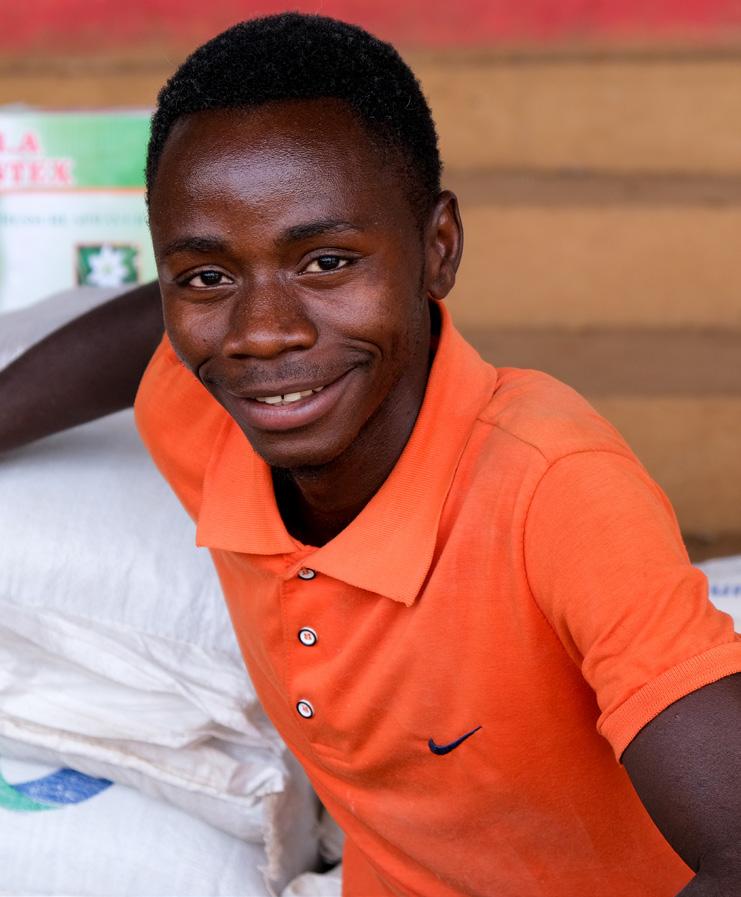
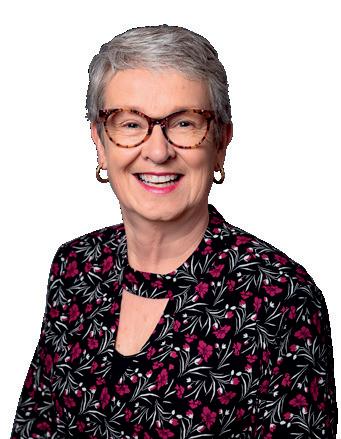
Lutheran Media Manager
‘Thanks to what we received, there was a change in my daily work. Before, armyworms would attack the corn when it was two weeks old. But we used the products we received and the pests were eradicated.
We were also able to spray the beans with insecticides. Before, diseases attacked the crop at the start of growth. With the spraying, it grew well. Our crops are beautiful compared to others! I'm hoping for at least 250 kilograms. The money we make will be spent on feeding the family, buying clothes, health care, and fertiliser for next season. I'd like to buy another plot to extend my plantations and put a tin roof on the house.
Now, I'm going to help others with the techniques I've learned. I'm delighted, motivated and honoured. Thank you!’
You can bless others like Francois by dedicating a gift in your Will to keep on helping people through ALWS. As you do, those you love will see the values precious to you live on. See the story in this edition. alws.org.au * 1300 763 407
‘I want to develop my pig farm to have a whole herd at home. I wish to become the boss of the hill!’

You may remember Richard from last year’s ALWS Gifts of Grace. The kindness of our Lutheran family has supported Richard to increase his harvest FIVE TIMES!
‘Before the project, I was a farmer but had to work as a labourer in the fields to get money. I was so poor that I didn't have soap to wash my clothes. I couldn't buy clothes. I had no farm animals.
When the Lutherans came, they helped us start a cooperative. They trained me on how I can cultivate my fields. Before, I had a land of 40 x 35 m. I planted 12 kilograms of seeds but only harvested 20 kilos. Now, with organic manure and fertiliser, for the same area, I harvested 100 kilos of beans.
the cooperative. We bought a plot of land, built our own house and bought a pig. Now, we breed animals in a modern way, and I can start a pig farm with my family. If someone gets sick in my family, I can pay to treat them.
‘I used to use 5kg of corn seed and harvest 35kg. After the training, I harvested 200kg!’
I also received training on how to make a loan and start another business for more income. First, my wife and I identified an activity to do and asked for a loan from
The other members of the cooperative trusted me and elected me secretary. I keep the cash book and the stock book. When sharing benefits, all members are happy with the work done. I also help other cooperatives fill in their registers.
I am happy about the experience because I am proud of my work, and I do it right. I harvest, but I have the ambition that in the years to come I will expand the size of my field to have more profits.
I also want to develop my pig farm to have a whole herd at home.
I wish to become the boss of the hill. Thank you, on behalf of the cooperative!’
You are welcome to invite an ALWS guest speaker to share more stories like Richard’s. Learn how our Lutheran family is bringing love to life in some of the world’s poorest communities: 1300 763 407 * alws.org.au
